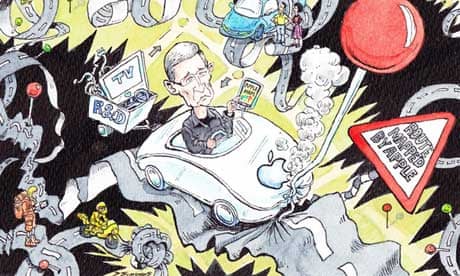Apple is focused on making the world's best products. Manically focused. Laser-focused... or so its chief executive maintains. Tim Cook has repeated the phrase time and again – on television, at conferences, during earnings calls – since he took over from the late Steve Jobs.
Should he choose to use it on Wednesday 23 January, when presenting Apple's latest financial update, the assertion may ring a little hollow. The company's share price has swooned by 30% since September, and is now hovering around $500.
Investors' ardour began to cool when the iPhone 5 made its debut. An incremental change on its predecessor, it had a screen that was larger but perhaps not large enough, in a case that dented far too easily. And one of its most useful features, Google maps, had been replaced by an in-house version riddled with errors. This fiasco showed that under Cook, the company was more than capable of releasing a substandard product. Many now fear Apple has lost its sense of direction.
Wednesday's numbers will still boggle the mind. Wall Street on average predicts that 48m iPhones will have been sold over Christmas, bringing the total since launch in 2007 to 320m. Only Samsung comes close, having sold 100m of its Galaxy S phones since 2010.
There is no doubt the iPhone remains one of the trendiest gadgets of our times. And one of the most glamorous. In the tradition of the Hollywood studios with which it shares a coastline, Apple bottled the American dream and sold it to the world.
The stars of its studios are not just entertaining and beautiful; they are useful and revolutionary. Jobs opened the door to a post-industrial age by turning the possibilities offered by the digital medium into reality. He did this by taking good ideas with which others had failed – MP3 players, internet-connected phones, tablets – and making them enjoyable and easy to use.
Apple's success is built on execution rather than invention. Its next big project, the internet-connected television, will require perfect execution if it is to succeed. The market is a cutthroat one. Margins are so low that screen makers find it hard to turn a profit – even Sony's well-made sets lose money.
More dangerously, Apple is taking on some of America's most powerful businesses, from cable companies such as Comcast to studio giants such as Time Warner and News Corporation. If Apple is successful, this new device will put viewers in the driving seat, letting them watch the shows they want without having to buy a bundle of expensive channels.
When Apple created the iPod, the music business was bloated, decadent, disorganised and either unable or unwilling to adapt to a digital world. The television industry, while ripe for reform, is better prepared to fight.
Perhaps that was why no Apple television appeared last year – latest predictions are for the end of 2013. Without a new product to propel sales, analysts warn, Apple's margins will slip.
Smartphones are now highly evolved objects, and small tweaks will not be enough to persuade western buyers to pay for an upgrade every year or two.
The battleground is moving to emerging markets, and few people in those markets can afford Apple's products. Cook has two choices: leave large swathes of the earth, from China to Brazil, unclaimed and watch as Samsung, Nokia and others pile in with their versions of a product category Apple created, or produce a budget version of the iPhone. The cheaper device idea is tempting, but that will eat into the company's enviable 26% profit margin, as the iPad mini may already be doing.
As far as many investors are concerned, these decisions about how far and how fast to expand are nice dilemmas to have, and not impossible to solve.
The odds may be stacked against Apple continuing to create the best products in the world, but it is still busy collecting the windfalls of its earlier achievements.
Adventurous crimes?
Should you be intending to tell a lie, tell a big one. That seems to have been the strategy of those behind two audacious property loan scams, each exceeding £100m in scale, the repercussions of which played out separately in criminal courts in London and Manchester last week.
There are striking parallels between Achilleas Kallakis, the Croydon travel agent who reinvented himself as a Mayfair property baron, and Shaid "Lucky" Luqman, the Manchester chancer accused of having siphoned millions of pounds of money to his family in Pakistan.
Both men presented bogus loan paperwork to credulous bankers who were blinded by the bonuses to be made from big deals in the booming property market in pre-credit-crunch Britain. Both lied about their wealth, their background, invented university degrees and featured in the Sunday Times Rich List. Most shockingly, both had past convictions for fraud. In the case of each, the façade would have come crashing down under the most basic scrutiny. Moreover, these were frauds in which the bankers, rather than their customers, have been played for fools.
Kallakis borrowed more than £800m from Allied Irish Bank, Bank of Scotland, Bristol & West, Barclays and GE Capital. Judge Andrew Goymer sentenced him to seven years, but added that the first two of these banks "do bear some degree of responsibility" for the fraud, as "corners [were] cut … checks superficial and cursory".
Meanwhile, Manchester crown court heard how Luqman had borrowed more than £100m from Barclays – loans the bank later sold on in part to other lenders. Here again, according to Serious Fraud Office, "there was a great deal of trust involved". (Luqman was not present to hear this: he fled to Pakistan before he could be charged.)
Kallakis and the Luqman are patently rogues of the first order. But in the times in which we live, there is something of a Dick Turpin-style romance about adventures.
